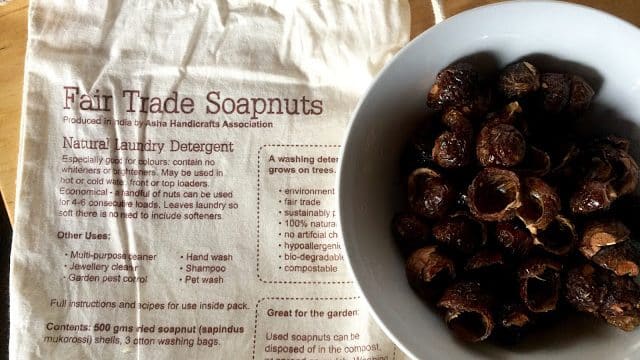Have you heard of Soapnuts? They are a super simple, 100% natural, cheap and effective way to wash all your clothes. They are great for sensitive skin and the garden, support fair trade community enterprises in India, are a healthier option, help reduce electricity & water use, and save you money.
I’m not sure why I had forgotten about these wondrous things – I had used them in the past. I’m so glad to have rediscovered them in my world. Thanks to Plastic-free July for making me reassess lots of my current practices.
If you’ve heard of the, but been reluctant for one reason or other to try, I wholeheartedly encourage you to give them a go. If you are already using them, let us know how you find them….
Soapnuts are not actually nuts, they are dried berries of the Indian Soapberry tree (Sapindus mukorossi). I think they are absolutely amazing – for all of the reasons I explain in this post and more – but particularly for inspiring my 8yo son to be interested in learning how to do laundry! He was super proud of himself today and wants this to be one of his jobs (woohoo!!)
 |
| Soapnuts inspired young Hugh to learn the ropes in the laundry today. He was super excited – me too! |
 |
| Put a small handful in a little bag provided and toss into the washing machine – it’s that simple!! |
Here’s some amazing bits of information about soapnuts. Check them out:
- Each wash costs around 5-10 cents. A 500gm bag of soapnuts can last you 200-400 washes – more if you use cold water and crush the pieces a bit more.
- Soapnuts come from a very large tree that produces prodigious amounts of this saponifying nut that you can use as a greywater safe laundry detergent, dish, hand soap pet soap, shampoo…
 |
| Lots of ways to use them… |
- Soapnuts are great for washing cloth nappies. They eliminate lingering odours and due to their antibacterial qualities, leave the nappies clean and safe for baby. They will also clean nappies of all residue from chemical detergents that can potentially harms sensitive skin, and leave them more absorbent and softer.
- Soapnuts make towels feel soft and more absorbent without the need for toxic fabric softeners
- Soapnuts are great for delicate fabrics such as wool and silk.
- You don’t need to do a rinse cycle as there is no soapy residue to rinse out! You can therefore reduce the machine rinse cycles and save electricity and water. The greywater is great for the garden.
- After you’ve done 4-6 loads with each handful, put them in your compost bin, worm farm or scatter over your garden bed. They are 100% biodegradable and great for your garden!
- Tip: Pre soaking your washing in soapnut liquid overnight will assist with especially dirty loads.
- Tip: Crush the soapnuts into smaller pieces so that the surface area in contact with the water increases – easier release of the saponin.
 |
| All the things I look for in products… |
 |
| I bought mine from New Internationalist because they were offering them at a good price, but mostly because I knew they would definitely be Fair Trade. |



I have used them in the past. Time for me to give them another go.
Love the fact that I can then add them to my allotment to break down.
How well do these work on really dirty clothes? I'm a horse rider & my loads often include sweat soake tops & filth encrusted breeches. Do they get dirt & grass stains out well?
Also….if clothes are extra dirty I find adding 1/2 cup of baking soda and splash of vinegar to a wash cycle helps tremendously!
I love soap nuts!they are fantastic for all clothing….even dirty cloth nappies. Great for the environment but also for sensitive skin. Our little one suffered terrible eczema which we have under control now but had a reminder when he was exposed to washing liquid while staying with a relative recently and had a big flare up again.
I wonder if they can be grown in Australia?….all in the quest for self reliance.
I hear there is one growing in the Sydney botanic gardens but has not fruited. I'm trying to find out how effective the Australian Native Soap Tree is (Alphitonia excelsa or Red Ash).
I actually keep the spent soap nuts after each load. They can be boiled to make lquid soap for dishes and hand washing. Having strained the nuts with a cloth, I use said cloth to clean my kitchen bench, sink and draining board. Cloth goes in the next wash (adds to suds) and then I use the nuts again… I have a 'fresh brush' toilet cleaning stick. I wrap a few nuts in toilet paper and use that to clean the toilet. The little package gets flushed into our worm farm septic system. 🙂
I wash in cold water on the eco cycle. My clothes are clean (no strong detergent smell which i never liked) and soft (no softener). The washing machine water goes straight to the veg garden.
Thanks for this – you've inspired me to purchase some and give them a go!
I have a front loader HE washer, would the soap nuts work in that type of machine as well?
Hi, I'm moving to Australia and curious about the Red Ash tree as well. Have you found any good resources on this?